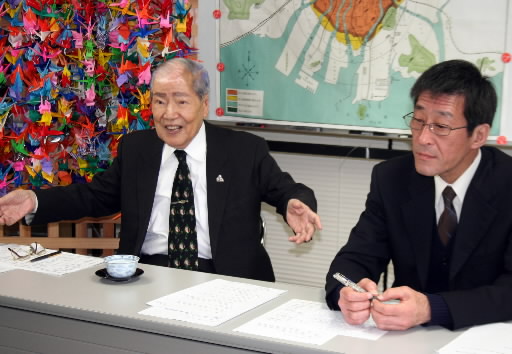My Life: Interview with Sunao Tsuboi, Chairperson of the Japan Confederation of A- and H-Bomb Sufferers Organizations, Part 13
Feb. 5, 2013
New generation
by Sakiko Masuda, Staff Writer
Amid aging of survivors, entrust future to their children
When Mr. Tsuboi’s eldest daughter was in junior high school, there was a time when she worried about being the child of an atomic bomb survivor.
In her peace education class in junior high school, apparently the teacher said that the health of the second generation would be affected. The teacher had no medical background and must have said that without giving it much thought. But my daughter was really depressed. She played sports and was very healthy, but she thought she was going to die young.
It was my own child, so it was all the more painful for me. I tried to encourage her saying, “I went through the A-bombing and nearly died, but I’m still alive. If you want to live, you can. Don’t worry about it.” Gradually she cheered up.
The Hiroshima Prefectural Confederation of A-bomb Sufferers Organizations (Hidankyo), of which Mr. Tsuboi is chair, has a working group that focuses on issues related to the second generation. The group conducted a survey in 2011. Although nearly 60 percent of the children of atomic bomb survivors said they had been healthy so far, 64.5 percent said they worried about future health problems.
From research, it’s still not clear whether or not there are genetic effects, so we have to be careful about what we say. But the children of survivors are very concerned. During the more than 10 years after the war when there was no government relief for the survivors, we lived with uncertainty too.
First of all, we need to dispel the anxiety of the second generation by working to have the scope of the health checks they are given broadened to include cancer screening. As A-bomb survivors, there are lots of things we need to do to encourage them. The results of the survey need to be analyzed in more detail.
The atomic bomb survivors are growing older year by year. Their average is over 78.
When I travel around Hiroshima Prefecture, I find that the A-bomb survivors are growing older and there’s no one left to serve on the board of Hidankyo. We have to take action, keeping in mind the need for the second generation to take over for us. I want to say to them, “Rouse yourselves up and carry on!”
What I want to ask of the children of the survivors is that they listen to our stories more closely than ever. But if we just think about having them understand our feelings and do all the talking, we’ll just be forcing the issue on them. We have to avoid that. I would like them to pull together and take steps toward the abolition of nuclear weapons.
(Originally published on February 2, 2013)
by Sakiko Masuda, Staff Writer
Amid aging of survivors, entrust future to their children
When Mr. Tsuboi’s eldest daughter was in junior high school, there was a time when she worried about being the child of an atomic bomb survivor.
In her peace education class in junior high school, apparently the teacher said that the health of the second generation would be affected. The teacher had no medical background and must have said that without giving it much thought. But my daughter was really depressed. She played sports and was very healthy, but she thought she was going to die young.
It was my own child, so it was all the more painful for me. I tried to encourage her saying, “I went through the A-bombing and nearly died, but I’m still alive. If you want to live, you can. Don’t worry about it.” Gradually she cheered up.
The Hiroshima Prefectural Confederation of A-bomb Sufferers Organizations (Hidankyo), of which Mr. Tsuboi is chair, has a working group that focuses on issues related to the second generation. The group conducted a survey in 2011. Although nearly 60 percent of the children of atomic bomb survivors said they had been healthy so far, 64.5 percent said they worried about future health problems.
From research, it’s still not clear whether or not there are genetic effects, so we have to be careful about what we say. But the children of survivors are very concerned. During the more than 10 years after the war when there was no government relief for the survivors, we lived with uncertainty too.
First of all, we need to dispel the anxiety of the second generation by working to have the scope of the health checks they are given broadened to include cancer screening. As A-bomb survivors, there are lots of things we need to do to encourage them. The results of the survey need to be analyzed in more detail.
The atomic bomb survivors are growing older year by year. Their average is over 78.
When I travel around Hiroshima Prefecture, I find that the A-bomb survivors are growing older and there’s no one left to serve on the board of Hidankyo. We have to take action, keeping in mind the need for the second generation to take over for us. I want to say to them, “Rouse yourselves up and carry on!”
What I want to ask of the children of the survivors is that they listen to our stories more closely than ever. But if we just think about having them understand our feelings and do all the talking, we’ll just be forcing the issue on them. We have to avoid that. I would like them to pull together and take steps toward the abolition of nuclear weapons.
(Originally published on February 2, 2013)








